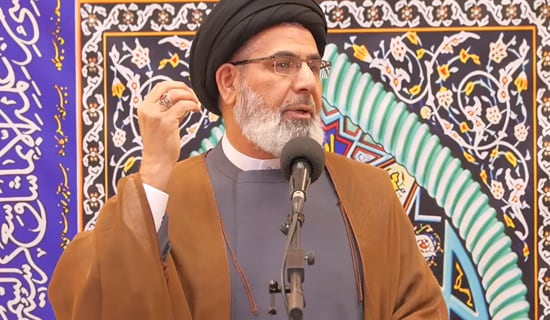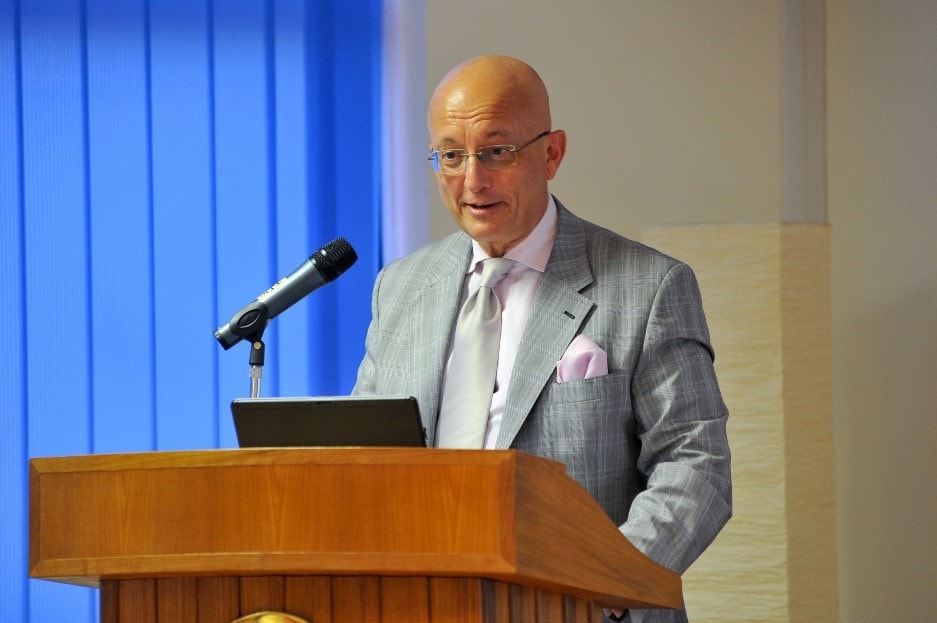The following report is now a complimentary offering from MEMRI's Jihad and Terrorism Threat Monitor (JTTM). For JTTM subscription information, click here.
In a recent article, noted Indian journalist and author David Devadas warned that a new wave of Pakistan-backed terrorism is yet to come to Kashmir. Devadas, who has written multiple books on terrorism in Kashmir, argued that India's decision to quash Article 370 and Article 35A, thereby reducing the special status of Jammu & Kashmir from a state to a federally administered territory, was bound to elicit a response from Pakistan.

Devadas's article, titled "Terror In Kashmir Has A New Edge, And Regional Uncertainty Makes It Worse," comes after a number of Indian security forces and terrorists were killed in clashes in late April and early May, as the Kashmir Valley was under double lockdown – for Coronavirus since March 25 and under extreme curbs since August 5, 2019, when the constitutional changes were effected. He argues that Pakistani response could come anytime, between now or next year.
Jammu & Kashmir was a Muslim-majority independent princely state at the time of partition in 1947. The territory is currently divided between India and Pakistan by a Line of Control (LoC). Around the time the erstwhile Soviet Union withdrew from Afghanistan in 1989, Pakistan-backed jihadi terrorism began in Kashmir.
Devadas says the parallels in 2020 are similar: As U.S. forces withdraw from Afghanistan this year, Pakistani-backed jihadism is likely to rise in Kashmir. This creates a larger regional conflict for India, especially in view of border clashes with China at Ladakh in Kashmir region and in Sikkim, which is situated in India's northeastern region.
"It Was... After The Titles Of 'Prime Minister' And 'Sadr-e-Riyasat' [President] Were Reduced [by India] To 'Chief Minister' And 'Governor'' That Kashmir's First Militant Group, Al-Fatah, Came Up In 1967"
Following are excerpts from the article:[1]
"Startling [counter-terrorism] successes in at least three encounters with the [Indian security] forces since early April indicate that much better trained terrorists are around. That they are infiltrating [from the Pakistani side of Line of Control] even while the huge snowfall of this past winter has yet to melt indicates that many more might turn up this summer. The five intruders who managed to kill an entire unit of Special Forces commandos [on April 6 in the Keran sector in Kashmir] must have been extraordinarily well-trained.
"I have said for a decade now that the training module that prepared the 10 fellows who wrought havoc in Mumbai [terror attacks] in 2008 could not have been set up for just 10 boys. More must surely have been trained. Could it be that such men are now crossing the Line of Control? Meanwhile, a number of Kashmiri youths have signed up for militancy in recent weeks. And during agitations following the recent killing of Hizbul Mujahideen 'commander' Riyaz Naikoo, there were violent struggles between the local population and the police.[2]
"Lessons from history
"I have a sinking feeling about all this, because it's not entirely unexpected. In fact, I more or less predicted it the day the constitutional changes on Jammu & Kashmir were introduced last August [2019]. A few days later, a Bharatiya Janata Party [i.e., the ruling BJP] spokesman berated me during a TV debate for being 'pessimistic'. There was good reason for pessimism. Based on recent history, I feared a revolt, not immediately, but after a year or two. It was a couple of years after the titles of 'prime minister' and 'Sadr-e-Riyasat' [president of the state] were reduced [by the Indian government] to 'chief minister' and 'governor'' that Kashmir's first militant group, Al-Fatah, came up in 1967.
"And a massive armed revolt erupted a couple of years after the ham-handedly rigged 1987 assembly election [of Jammu & Kashmir state]. In The Story of Kashmir, I have shown the link between that rigging and that eruption. Abdul Ahad Waza, Pakistan's pointman to initiate militancy, was briefly in jail where he met young Ishfaq Majid Wani, who had been jailed for pelting stones at [Kashmiri politician] Farooq Abdullah soon after those elections. By 1989, Ishfaq had become the 'chief commander' of the Jammu Kashmir Liberation Front."
"It Would Be Foolish To Think That Pakistan Would Not See The Surprise Constitutional Changes [That Reduced Kashmir's Special Status] As An Opportunity To Undermine The Indian State In Kashmir"
"Wrong calculations
"The massive deployment of [Indian security] forces on the eve of the constitutional changes [effective August 5, 2019,] indicated that the government presumed that young Kashmiris would rush out of their homes pell-mell, pelting stones, immediately after the decision was announced. In fact, BJP workers in Kashmir were told that the government was prepared for very large numbers to be killed in long drawn-out mayhem.
"Policymakers obviously extrapolated that scenario from what happened after Hizbul Mujahideen 'commander' Burhan Wani was killed in 2016. That indicates a superficial understanding of what happened then. Most likely, a coordinated plan was put into motion the night Burhan was killed. Five to six hundred loudspeakers were in action by dawn, and just about every mob attacked a security force camp that morning, something that had never happened before.
"Agents provocateurs at each location channelled highly strung emotions into the contours of the coordinated plan. In fact, I suspect information on Burhan's whereabouts may have been planted from across the Line of Control [by the Pakistanis] in order to spark those agitations.

Burhan Wani's killing in 2016 led to spurt in anti-India protests
"A frittered opportunity
"It would be foolish to think that Pakistan would not see the surprise constitutional changes as an opportunity to undermine the Indian state in Kashmir. But it would be equally foolish to think it would come up with a plan overnight. That was bound to take time. Addressing the elite of the Hindutva [right-wing] movement at the India Foundation's Ideas Conclave on the last day of February, I predicted that a delayed response could come either this summer or the next.
"The powers that be remained unperturbed. For the last several months, discussion in power circles has remained lamely focused on economic 'delivery' and on re-starting a 'political process'. Both those agenda heads have been repeated ad nauseam since 1953. Indeed, they were accomplished with great efficiency between 1954 and '63 and have been re-accomplished several times since. That's during the much-touted 'sattar saal' (70 years – [of non-BJP regimes]) but ironically, not in the last six [years of the rule under Prime Minister Narendra Modi], or even the last 12, years.
"I warned at that conclave that a great opportunity to make a fresh start, at least in Jammu and Ladakh, had been wasted since [federal] Governor's Rule was imposed in mid-June 2018 [by destabilizing and removing the elected government from power]. It was an opportunity to show the people of the erstwhile state that a new beginning had brought more responsive, clean governance and a more prosperous future. But there had been no impact on the ground, and time was running out."
"The Fact Is, There Is No Permanent Border Agreement Between The Two Asian Giants [India And China] — And Our... Neighbor [China] Is Determined To Be The Lone Giant"
"Unsettling rumours
"The trends of the last few weeks [April-May] indicate that time might already have run out. Not much will now be possible on the ground amid increased terrorist action. A massive round of public unrest could accompany it, by next year if not already this summer. There were whispers in Kashmir during Ramzan of 2016 that the situation would be hugely unsettled after Eid. Indeed, Burhan was killed two days after Eid-ul Fitr, and mayhem followed for four months.
"A Srinagar-based friend reported rumours over the past few days that a round of militancy is coming that will be a level beyond anything in the last 30 years. One hopes that will turn out to be idle chatter, but it is worth noting. Delhi's policymakers must wake up at least now, for India faces a broad phalanx of challenges, which greatly complicate this scenario.
"Triad of inter-linked threats
"I stated in a lecture as far back as March 2011 that a triad of threats to national security had emerged and would at some point converge: street rage among young Kashmiris, Pakistan's designs, and China's desire to show India down and deprive it of de jure claim to the Northern Areas [i.e. Gilgit Baltistan] of Jammu & Kashmir (which has become the key to the China-Pakistan Economic Corridor). I have held to this view since: the three factors are interlinked.
"In this light, government strategists ought to insightfully examine what this month's skirmishes between Chinese and Indian troops in both Ladakh [in Kashmir region] and Sikkim [in India's northeast] might possibly portend. It could be that China is exerting warning pressure as India prepares to take over as chair of the World Health Organization just when questions are being raised harshly over China's role with regard to the Coronavirus pandemic. On the other hand, strategic objectives closer home could also be at play.
"The fact is, there is no permanent border agreement between the two Asian giants [India and China] — and our ... neighbor [China] is determined to be the lone giant. India has taken important steps to beef up its border patrols but must be ready for any eventuality. Territorial challenges have been apparent in both Ladakh and Sikkim during the past few days. Although a Chinese army major was promptly biffed on the nose for saying, during a skirmish, that Sikkim was not India's territory, that punch might not entirely suffice to hold the [Chinese] dragon at bay."
"All This Is Happening Just When The U.S. Is Leaving Afghanistan To The Pakistan-Backed Taliban, Who Could Turn Their Attention To Kashmir By Late Summer"
"Bleak international scenario
"All this is happening just when the U.S. is leaving Afghanistan to the Pakistan-backed Taliban, who could turn their attention to Kashmir by late summer. The U.S. plans to leave by July and will by then be neck-deep in elections.
"Just at this uncomfortable juncture, Nepal has protested a new Indian road through what it claims is Nepalese territory and has increased border deployment. Nepal's communist government tilts toward Beijing. China gained hugely when the Indian government alienated Nepal's elites by allowing a border blockade in 2015.
"Prime Minister Modi's effort to forge a joint South Asian response to the Covid-19 challenge was a good step. Nevertheless, large parts of India's land borders remain troubled.
"This challenging wider context makes one doubly uneasy about the increasing tempo of violence and public anger in Kashmir. The erstwhile state is, after all, located at the junction of India's two major borders [Pakistan and China]."
[1] Newslaundry.com (India), May 14, 2020.
[2] MEMRI JTTM report Indian Media Report Profiles Hizbul Mujahideen Commander Riyaz Naikoo: 'The Future Of The Kashmir Jihad Will Depend Not On... Who Succeeds Naikoo, But The Generals In The [Pakistani] Inter-Services Intelligence', May 6, 2020.




